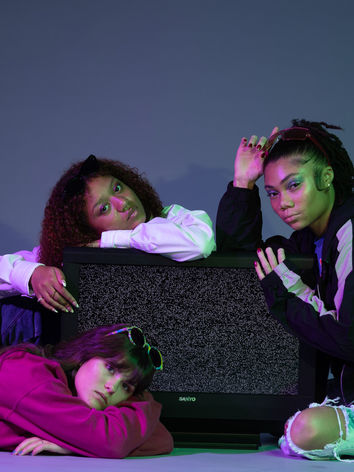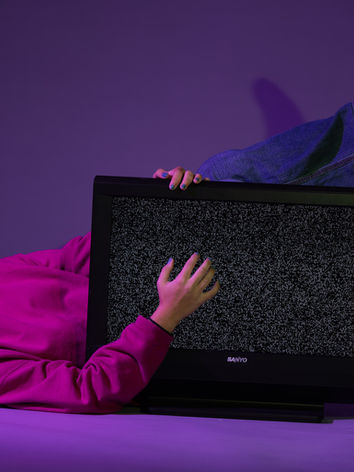Static
photographers Alayna Jones
stylist Neveah Banks
journalist Chimazu Ndukwe
director Melanie Do
graphic designer Jaiden Creggor
models Abbigail England, Alisia Knox, Kamryn Poindexter and Aiva Van Vels
photographer assists Ella Buss, Kip Gilbert and Madison Hill
stylist assist Bryn Oaks
As the glow of television screens becomes a constant in daily life, especially with the rise of binge-watching and endless streaming options, the subtle influence of what we consume on our personalities has never been more apparent. The phrase “I Saw the TV Glow” evokes an almost hypnotic pull of media, a reminder that what we watch often illuminates more than just a screen—it casts a lasting glow on our inner selves, shaping our values, beliefs and even our sense of self. With the new year on the horizon, many will embrace the familiar mantra of “New Year, New You,” vowing to reinvent themselves. But what if a large part of that transformation comes not solely from personal willpower but from the media we engage with? Could our next favorite show become the spark for an entirely new persona?
In a way, “I Saw the TV Glow” speaks to the intricate nature of modern media and how we’re drawn into characters' lives and story arcs, absorbing bits of their journeys that may subtly influence our own. Characters on TV often embody aspirations, fears or qualities we may relate to, idealize or even find ourselves wanting to emulate. A protagonist's courage or wit can become aspirational markers, while a villain's complexity can make us ponder the darker parts of ourselves. This glow isn't just entertainment; it’s an invitation into countless perspectives, a silent guide to navigating our own struggles, relationships and ambitions.
Television today functions almost like a mirror, albeit a distorted one, reflecting the parts of society that we resonate with or aspire to change. Characters in shows like “Breaking Bad” or “Euphoria” can reveal how thin the line is between light and darkness within all of us, pushing us to consider how we’d act under similar pressures. In contrast, shows like “Ted Lasso” or “The Good Place” may inspire us to lean toward kindness, growth and self-improvement.
This constant glow becomes a part of our identity-building process, influencing everything from our language to the values we internalize. The familiarity of a character’s journey, their victories and failures, can even guide us through our own reinventions, giving context and texture to the abstract notion of “New Year, New You.” Whether consciously or not, we’re constantly negotiating with the personas we see onscreen, and in the process, those flickering stories and characters leave an imprint on who we choose to become.
Cultural references have long played a role in how people present themselves. Whether it’s slang picked up from a popular TV series, wardrobe choices influenced by fictional characters or even the outlook on life inspired by on-screen narratives, the content we consume has a powerful ability to shape who we are. This concept isn’t entirely new — generations have seen trends, mannerisms and even ideologies spread thanks to popular media. But in today’s hyper-connected world, where new shows, social media trends and internet culture can explode overnight, the influence is faster and more pervasive than ever.
Think about how instantly recognizable phrases like “I’m the one who knocks” from “Breaking Bad” or “Winter is coming” from “Game of Thrones” have become, not just cultural staples but markers of identity. People adopt these references, sprinkling them into their own dialogue, and with time, these bits of media become a part of their personal narrative.
For some, this shift is unintentional, absorbing characteristics or speech patterns from characters without even realizing it. For others, it’s a deliberate choice. The new year provides a perfect excuse to adopt a new persona. In 2024, will people be more like their favorite characters from “The Bear”—gritty and determined— or will they lean into more escapism such as “The Witcher?”
With this in mind, the idea of the new year bringing about a "new you" takes on added weight. It’s no longer just about setting goals to improve physical health or work productivity. For many, the new year signals an opportunity to reassess and recall their personalities. The media they watch may be a large part of that transformation.
Take social media as an example. People often curate their personalities online based on the types of shows and celebrities they follow. A person’s Instagram or TikTok profile might be styled after their favorite characters or influencers, showcasing what they deem the most “ideal” version of themselves.
But does this process signal a lack of authenticity? Not necessarily. In fact, some experts argue that this type of transformation— whether inspired by pop culture or not— can be empowering (How to Get Back on Track with Your New Year’s Resolutions, 2024). Adopting new traits, whether it is assertiveness learned from a favorite TV hero or adopting a calmer demeanor from a more meditative character, can help people grow into the versions of themselves they aspire to be. This transformation allows individuals to sculpt their identities in meaningful ways.
So, how much of our personality reinvention is influenced by the shows we watch? The answer might vary depending on the viewer. However, one thing is clear: the power of the media to influence not just what we think, but who we are, is undeniable. As people reflect on 2024 and look toward 2025 with hopes of personal growth and change, it’s worth asking: which characters, narratives or cultural moments will be part of that transformation?
Shows like “Breaking Bad,” “Euphoria,” and “The Good Place,” have offered a variety of characters to draw from, some representing darker, and different personas, while others are beacons of hope and optimism. The key takeaway is that as media consumers, we’re not just watching passively; we’re taking in ideas about how to be in the world. And with the rapid pace at which new content is released, the references and personalities we adopt can shift just as quickly.
As we march into a new year, it’s worth reflecting on how much of our “new selves” will be shaped by the content we consume. Whether it’s adopting the confidence of a leading character or learning to speak out more thanks to a political drama, television and media will undoubtedly play a part in shaping our 2024 selves. So, if the glow of your favorite series is lighting your room on New Year’s Eve, don’t be surprised if it also lights the way for a new persona in the year ahead.
Citations
How to get back on track with your New Year’s resolutions. (2024, February 12). NBC News. https://www.nbcnews.com/health/health-news/get-back-track-new-years-resolutions-rcna136787






